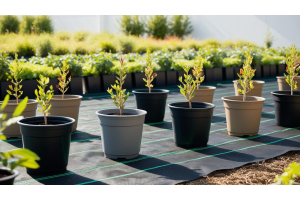What is Bio-security? and why should it matter in horticulture?

Biosecurity is crucial in horticulture because it helps protect plants, crops, and entire ecosystems from a wide range of biological threats. These threats can include pests, diseases, invasive species, and other harmful organisms that can cause extensive damage to horticultural systems.
Here's a more detailed look at why biosecurity is important in horticulture:
- Prevention of Crop Losses: Horticultural crops are vulnerable to various pests and diseases that can cause significant damage. Effective biosecurity measures help prevent the introduction and spread of harmful organisms that could devastate crops, leading to reduced yields, lower-quality produce, and financial losses for growers.
- Protection of Plant Health: Biosecurity practices focus on maintaining the health and integrity of horticultural plants. By preventing harmful pathogens and pests from entering or spreading within a greenhouse, farm, or garden, these practices help ensure plants remain healthy, grow properly, and produce abundant yields.
- Safeguarding Biodiversity: Invasive species introduced through horticultural practices can threaten native plant species and disrupt local ecosystems. Biosecurity helps prevent the spread of these invasive species, thus preserving biodiversity and maintaining ecological balance.
- Ensuring Food Security: Horticultural products form a significant part of the food supply chain. Biosecurity ensures that crops remain healthy and abundant, reducing the risk of food shortages caused by pest infestations or disease outbreaks. By maintaining food security, biosecurity also supports economic stability.
- Reducing Environmental Impact: When pests or diseases invade a horticultural system, extensive use of pesticides and other chemicals may be necessary to control them. This can have harmful environmental impacts, such as contaminating soil and water sources and harming non-target species. Effective biosecurity reduces the need for chemical interventions, promoting more sustainable horticultural practices.
- Facilitating Trade and Market Access: Biosecurity regulations are crucial in the international trade of horticultural products. Countries impose strict biosecurity standards to prevent the import of pests and diseases. Horticultural businesses can maintain market access by adhering to these standards, ensuring their products are safe and meet global trade requirements.
- Enhancing Reputation and Consumer Confidence: Customers expect safe, high-quality produce. Effective biosecurity measures in horticulture help maintain a reputation for safe and healthy products. This builds consumer confidence, increasing demand and loyalty to the brands and growers prioritising biosecurity.
- Mitigating Risks from Climate Change: Climate change can exacerbate biosecurity risks by expanding the range of certain pests and diseases. By implementing robust biosecurity practices, horticulturists can adapt to these changing conditions and reduce the risks of shifting pest populations and disease patterns.
Biosecurity is a cornerstone of successful horticulture. It provides a comprehensive approach to protecting crops, ensuring food security, preserving biodiversity, and reducing environmental impact. By prioritising biosecurity, horticulturists can contribute to a more sustainable and resilient agricultural system, ultimately benefiting the environment, the economy, and society at large.










